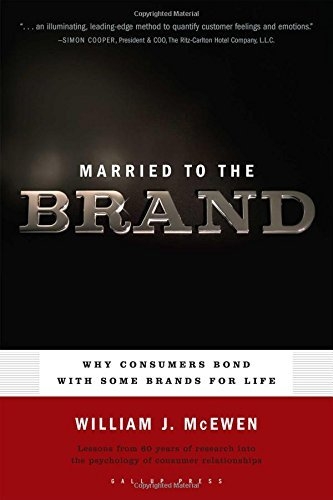How does a brand--a company or one of its products--stand out in an ever-louder and more chaotic marketplace? Why do customers develop intense and lasting bonds with some products they consume, but not others? What do winning brands do better than their competitors? Generations of marketers have pondered these questions, and Married to the Brand offers thought-provoking answers. Based on 60 years of research from the Gallup Organization, the book combines a thoughtful, data-driven approach with a playful metaphor. Author and Gallup researcher William McEwen sees customers' interactions with brands as markedly similar to the in-depth, extended relationships we see in marriages. From his opening pages, McEwen draws parallels between customers' feelings about brands and romantic relationships. For example, he points to the differences between "dating" and "long-term engagement". He explains how both commercial and romantic relationships require trust to start and build, but passion to flourish and sustain. He describes situations in which people might fall in love, then later seek a "divorce". Like other recent classics about brand marketing, like Scott Bedbury's A New Brand World and Al and Laura Ries' The 22 Immutable Laws of Branding, McEwen's book makes good use of anecdotal personal examples. He uses stories about individual consumers' interactions with the Starbucks (coffee) or Morton's (salt) brands, for example, to illustrate one of his central points: that brands grow not just from products, but from an overall customer experience which may include the original advertising that first drew attention to the brand, personal memories tied to the product, interactions with sales staff, the appearance and location of the physical store in which the product was purchased, and so on. He summarizes by describing a framework of "5 P's" that drive customers' perceptions of brands: product, place, promotion, price, and people. Taken as a whole, this book's lessons provide a provocative and interesting rethinking of brand management for marketers in a wide variety of industries. As McEwen himself writes, emotions connected to brands "aren't merely warm and fuzzy, nor should they be relegated to the world of greeting card poetry and Hollywood scripts. Emotions are both powerful and profitable, whether a company is marketing hamburgers or microprocessors." McEwen challenges his readers to build their brands patiently, over time. He attacks the conventional wisdom behind most companies' customer relationship management (CRM) or loyalty-marketing programs. Perhaps most importantly, he is realistic in stating from the book's outset that even the best brands will engage only a minority of their customers in true "marriage"-like relationships. But for the readers willing to invest the effort, in this book and then in the brand building that follows, the payoff appears worthwhile. --Peter Han
Authors
William McEwen
Additional Info
- Release Date: 2005-11-01
- Publisher: Gallup Press
- Format: Hardcover
- ISBN: 9781595620057
No copies of this item are currently available.
